Labor Secretary Alexander Acosta on Wednesday defended his role in the controversial 2008 prosecution of Florida billionaire Jeffrey Epstein. Acosta argued that, contrary to some media reports, he pushed hard on the case.
“This matter was appealed all the way up to the deputy attorney general’s office. And not because we weren’t doing enough, but because the contention was that we were too aggressive,” Acosta told the House Education and Labor Committee in response to questions from Rep. Frederica Wilson, D-Fla., who called his actions in the case “odious.”

Acosta has been criticized for his handling of the 2008 case, which resulted in Epstein’s conviction on two counts of prostitution. Epstein initially faced a 53-page federal indictment for crimes related in sex-trafficking and the abuse of dozens of women, many underage. A Miami Herald investigation into the case published last year portrayed Acosta as succumbing to pressure to limit the prosecution.
Federal judge Kenneth Marra ruled in February that the Epstein plea deal violated the Crime Victim’s Rights Act because of the “decision to conceal the existence of the [agreement] and mislead the victims to believe that federal prosecution was still a possibility.”
The same month, the Justice Department’s Office of Professional Responsibility announced it had launched a probe into whether Acosta’s actions as U.S. attorney amounted to professional misconduct.
Acosta said the Justice Department itself still backed his actions. “It is the department’s position in litigation that the Crime Victim’s Rights Act was not violated. I understand that the judge disagreed with the department’s position but we acted consistent with DOJ rules and protocols,” he said.
Wilson was not convinced, arguing he acted in “blatant violation” of the act. “When faced with criticism about this case you have hidden behind prosecutorial discretion, that you were just part of a prosecution team. Your actions suggests that you had some confusion about which team you were on,” she said.
Acosta has repeatedly defended his action in the case in appearances before the Education and Labor Committee, arguing most recently in April that the victims got restitution in the case.

